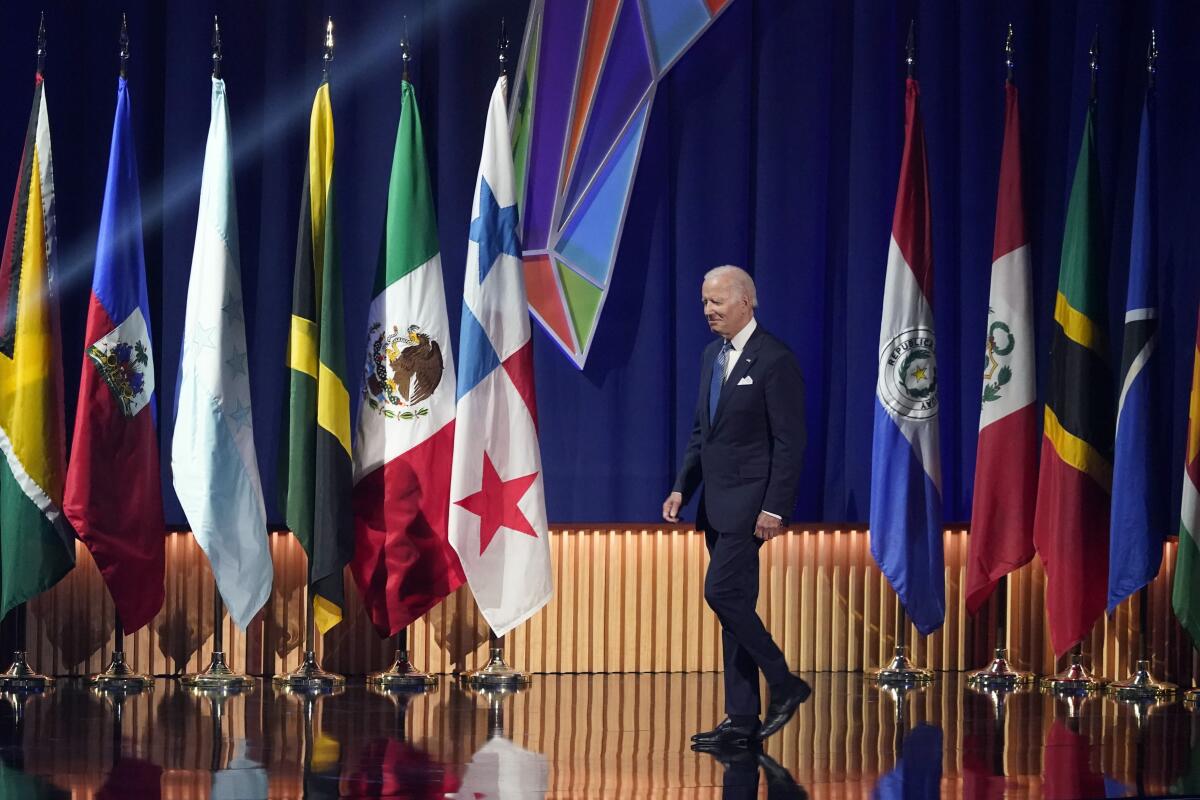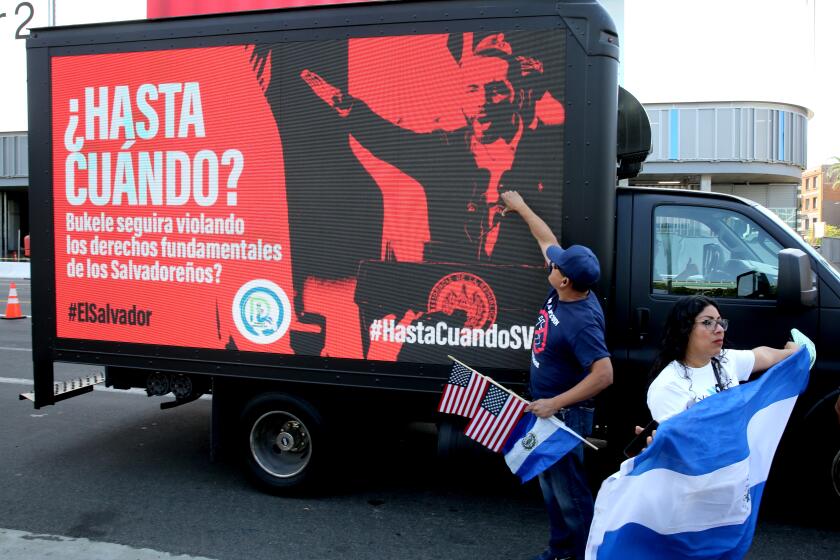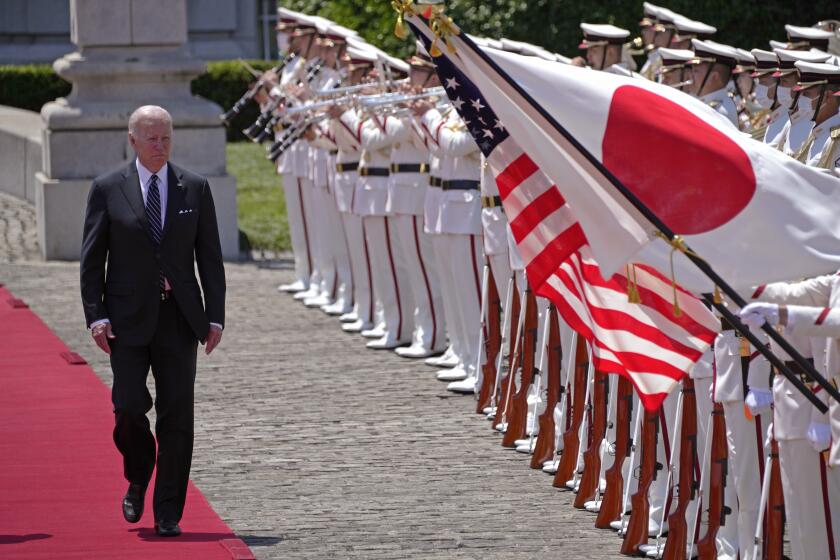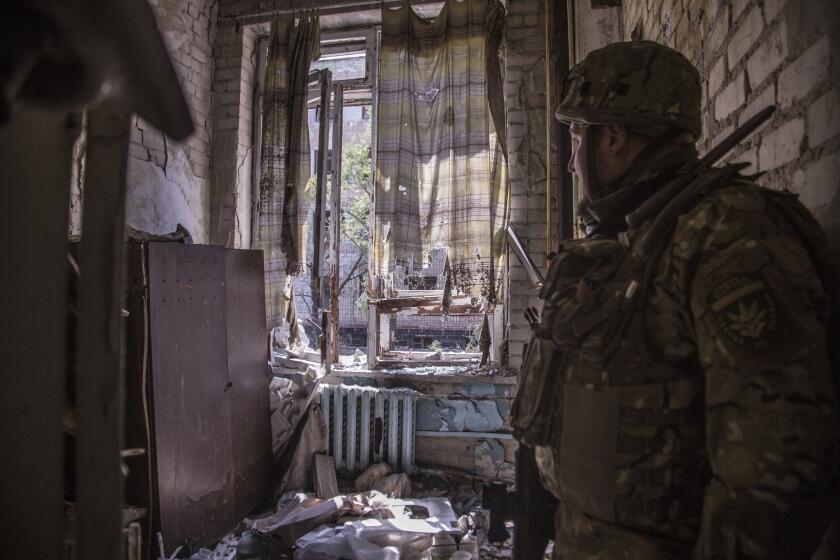Biden’s foreign policy prioritizes alliances. Beyond Ukraine, there’s little to show for it

- Share via
WASHINGTON — A year ago, during his first meetings with Group of 7 and NATO leaders, President Biden vowed that “America is back,” promising the world’s other industrialized democracies that they could once again count on the U.S. to shore up alliances and the global order.
In response to Russia’s invasion of Ukraine in late February, Biden led a reinvigorated transatlantic alliance that has gone to great lengths, often in spite of narrower national interests, to punish President Vladimir Putin and support Ukraine with tens of billions in aid.
Beyond Ukraine, however, Biden has struggled to deliver on his lofty rhetoric and the promise of a reinvigorated multilateralism. He has been hamstrung by record inflation and domestic politics, forced to confront a geopolitical reality that’s more complicated than the president often suggests when dividing the world into democracies and autocracies.
The global COVID-19 vaccination program the U.S. vowed to lead has fallen short; trade talks during Biden’s recent sojourn to Asia achieved little progress; and the president’s decision to exclude the leaders of countries considered to be antidemocratic from a major summit last week in Los Angeles led to an embarrassing boycott by Mexico’s president.
“Biden does have this view: Let’s just slap democratic paint on everything, and it’s going to make it better,” said Ian Bremmer, president of the Eurasia Group, a global risk assessment firm in New York. “There’s a lot of willingness to engage in performative diplomacy for the sake of performative diplomacy. That’s not meaningless, but it doesn’t solve real problems.”
Even as Russia’s atrocities have compelled major European allies to boost defense programs and lessen their dependence on Russian oil and gas, key partners like India and Turkey have been unwilling to sever ties with Moscow. And while Biden’s renewed focus on diplomacy has helped push U.S. allies long at odds with one another — Japan and South Korea, Israel and Saudi Arabia — toward improved relations, smaller, developing nations increasingly question their reliance on the U.S. and other world powers.
“The gap between the rich and the developing world is in some ways the most important foreign policy gap that is emerging,” Bremmer continued. “These countries just don’t see their interests as aligned with the richer countries.”
In a year marked by a global inflation crisis that has forced leaders in Washington and other capitals to scale back spending, the U.S. and allies have struggled to adequately fund or even launch several ambitious ventures.
The U.S. committed more than a third of the $11 billion in funding for the World Health Organization’s global COVID-19 vaccination program — a commitment that is smaller relative to the size of the country’s economy than those of other major contributors. “The Americans are underperforming,” Bremmer said.
Last month’s five-day trip to Asia yielded little beyond photo ops and loose commitments to eventually form a new Indo-Pacific trade pact that no countries seem to be seriously pursuing. And last week’s Summit of the Americas, hosted by the U.S. in Los Angeles, was an exercise in futility, defined largely by who didn’t show up and what didn’t get accomplished as the region grapples with a migrant crisis and pandemic-fueled economic devastation.
A migration pact signed by Biden and Latin American leaders, described by administration officials as the summit’s biggest achievement, included new U.S. humanitarian funding but mostly touted efforts already underway to manage migration.
Several leaders of nations that produce the most migrants were absent from the event due to a boycott over the Biden administration’s decision to exclude those it considers to be antidemocratic, from Cuba, Nicaragua and Venezuela.
The summit’s opening day was overshadowed by an announcement from Mexican President Andrés Manuel López Obrador that he would not attend, along with complaints from experts that the event lacked focus.
Similarly, the virtual “Democracy Summit” Biden convened in December was criticized by human rights advocates because the administration invited some nations allegedly engaged in human rights abuses but not others. The event forced the president to acknowledge that the United State’s ability to proselytize about democratic values had been weakened by the Jan. 6 insurrection by a pro-Trump mob trying to prevent the peaceful transfer of power.
A White House official said Biden “has restored American leadership on the world stage and revitalized our alliances and partnerships to deliver directly for the American people and people all over the world.” Biden’s diplomacy, the official said, has resulted in commitments last month by Asian companies to create thousands of manufacturing jobs in Georgia and Texas; the official also touted the president’s work in coordinating the International Energy Assn.’s largest-ever release of oil reserves to stabilize energy markets.
Biden’s worldview — setting up a global clash between democracies and autocracies — and his desire to organize the widest possible coalition to constrain China have also limited his foreign policy aims, according to Bruce Jones, director of the Project on International Order and Strategy at the Brookings Institution in Washington.
Organizing allies to confront China and to mobilize in defense of democracy “are actually in tension with one another on the world stage, and they have not reconciled that,” Jones said.
Not only is it not a universal worldview, but the U.S. needs cooperation from some non-democracies to help on a range of issues, he added.
“It’s not that they’re wrong that most of what they’re going to want to do rests with the powerful democracies, it’s just that there’s a pretty high amount of collateral damage when you organize that way,” Jones said. “Focusing on the role of the democracies — and of the powerful democracies — is a perfectly valid strategy; it is not effective diplomacy.”
For all of Biden’s efforts to reassert that democratic values remain sacrosanct, other interests can take precedence. Case in point: After more than three years of condemning Saudi Arabia’s crown prince for leading a “rogue state” following the gruesome murder of journalist Jamal Khashoggi, Biden plans to travel to Riyadh next month to reset relations with the regime. The president wants Saudi Arabia to pump more oil to help stabilize global energy markets. U.S. gas prices have surged over the last year, particularly after Russia invaded Ukraine.
“The administration’s record on alliances is strong on Europe and weak everywhere else,” said Kori Schake, a foreign policy expert at the American Enterprise Institute who served on President George W. Bush’s national security council and as an advisor to Sen. John McCain’s 2008 presidential campaign. (She endorsed Biden in 2020.)
“Asian countries are pleading for a trade deal, and the administration is giving them vague promises without much substance,” Schake continued. “And the constant talk about democracies being better than autocracies alienates some of the countries he needs to execute a broader strategy. That is standing in the way of them being able to produce the deeper kind of alliance cooperation outside of Europe that they say is their priority.”
Biden used to talk about the passion he gained traveling abroad. But his first trip to Asia as president has looked like a slog.
At last summer’s G-7, Biden and other leaders conducted a splashy rollout of “Build Back Better World,” a proposed infrastructure bank. It was conceived as a way to give developing nations an alternative to China’s Belt and Road Initiative for obtaining financing to modernize roads, bridges and rail lines.
U.S. officials and analysts said at the time that such an initiative could prove particularly effective in blunting China’s inroads in the Western Hemisphere. But the U.S. has made little progress on the initiative, so much so that it did not warrant a mention from Biden or other U.S. leaders speaking at the Summit of the Americas. (In advance of the summit, a U.S. official said the initiative would “formally launch” at this year’s G-7 and that Biden planned to discuss it in private meetings with Latin American leaders.)
“It’s a terrible idea to call a summit when there’s no agreed-upon definition of success. And here there’s no immigration policy, nothing on infrastructure, no major trade proposal,” said Richard Haass, president of the Council on Foreign Relations. “If we don’t want these other countries to go in China’s or Russia’s direction, we have to offer something, but it looks like we’re overpromising and underdelivering,”
The G-7 and NATO summits, which will take place this month in Germany and Spain, respectively, will focus largely on the war in eastern Ukraine and ensuring that the alliance holds together. The NATO summit, in particular, is likely to be historic, with Finland and Sweden, after decades of strategic neutrality, likely to join the defense pact. That move is a reflection of how Putin’s invasion of Ukraine has changed security considerations across Europe and strengthened the alliance he sought to test.
Despite the transatlantic unity, Russia’s war continues to ravage eastern Ukraine, and its outcome remains uncertain. The Western triumphalism of the conflict’s early months may be fading as the U.S. and its allies grapple with the war’s effects on inflation, food and energy supplies and leaders’ poll numbers. Americans, riveted early on by live coverage of the conflict, are paying less attention, focusing more on high gas prices, a shortage of baby formula and mass shootings — issues that, with the midterm elections fast approaching, Biden and Democrats will be highlighting as well.
“Despite knowing how much is at stake, we may lose focus because of all the domestic challenges,” said Constanze Stelzenmüller, an expert on European security issues at the Brookings Institution. “We have limits and constraints on power and on the costs we are willing to inflict on our own citizens, and Putin does not. We have a democratic handicap that Putin is completely free from.”
In short, the president’s primary foreign policy accomplishment may not hold.
The Ukrainian president called the city of Severodonetsk the ‘epicenter’ of his country’s confrontation with Russia, now in its 16th week.
More to Read
Get the L.A. Times Politics newsletter
Deeply reported insights into legislation, politics and policy from Sacramento, Washington and beyond. In your inbox three times per week.
You may occasionally receive promotional content from the Los Angeles Times.















